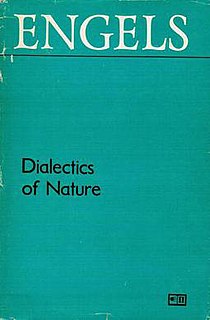 W
WDialectical materialism is a philosophy of science, history, and nature developed in Europe and based on the writings of Karl Marx and Friedrich Engels. Marxist dialectics, as a materialist philosophy, emphasizes the importance of real-world conditions and the presence of contradictions within things, in relation to but not limited to class, labor, and socioeconomic interactions. This is in contrast to the idealist Hegelian dialectic, which emphasizes the observation that contradictions in material phenomena could be resolved by analyzing them and synthesizing a solution whilst retaining their essence. Marx supposed that the most effective solution to the problems caused by said contradictory phenomena was to address and rearrange the systems of social organization at the root of the problems.
 W
WAnti-Dühring is a book by Friedrich Engels, first published in German in 1878. It had previously been serialised in the newspaper Vorwärts. There were two further German editions in Engels' lifetime. Anti-Dühring was first published in English translation in 1907.
 W
WThe Dialectic of Sex: The Case for Feminist Revolution (1970) is a book by the radical feminist Shulamith Firestone. Written over a few months when Firestone was 25, it has been described as a classic of feminist thought.
 W
WDialectics of Nature is an unfinished 1883 work by Friedrich Engels that applies Marxist ideas – particularly those of dialectical materialism – to nature.
 W
WDoctor Zhivago is a novel by Boris Pasternak, first published in 1957 in Italy. The novel is named after its protagonist, Yuri Zhivago, a physician and poet, and takes place between the Russian Revolution of 1905 and World War II.
 W
WLudwig Feuerbach and the End of Classical German Philosophy is a book published by Friedrich Engels in 1886.
 W
WMaterialism and Empirio-criticism is a philosophical work by Vladimir Lenin, published in 1909. It was an obligatory subject of study in all institutions of higher education in the Soviet Union, as a seminal work of dialectical materialism, a part of the curriculum called "Marxist–Leninist Philosophy". Lenin argued that human perceptions correctly and accurately reflect an objective external world.